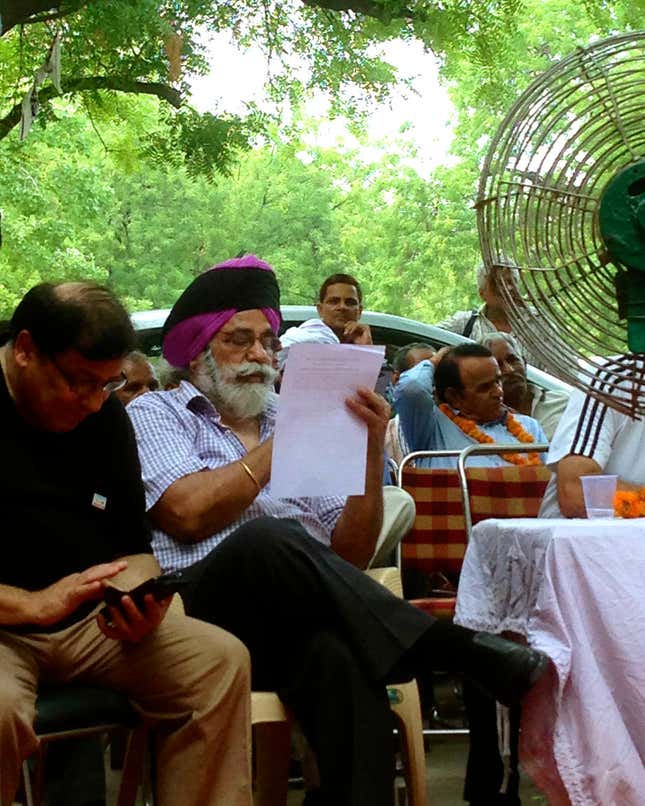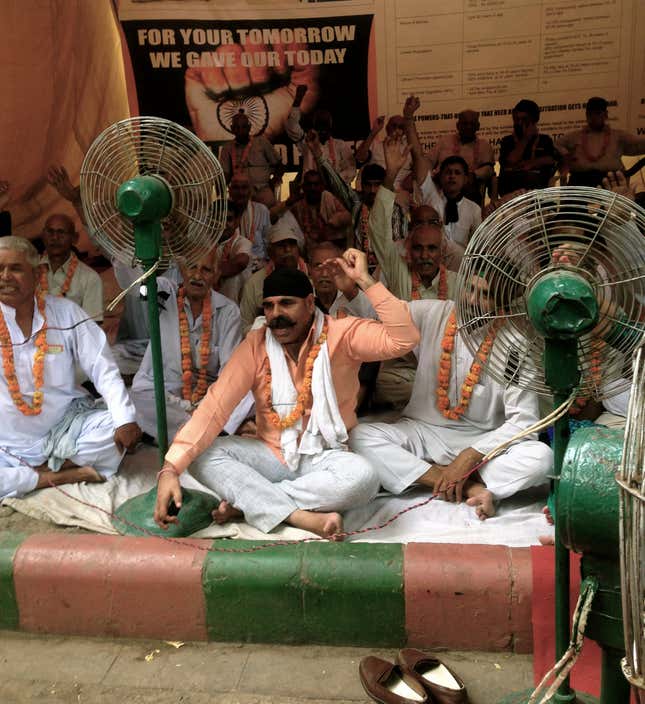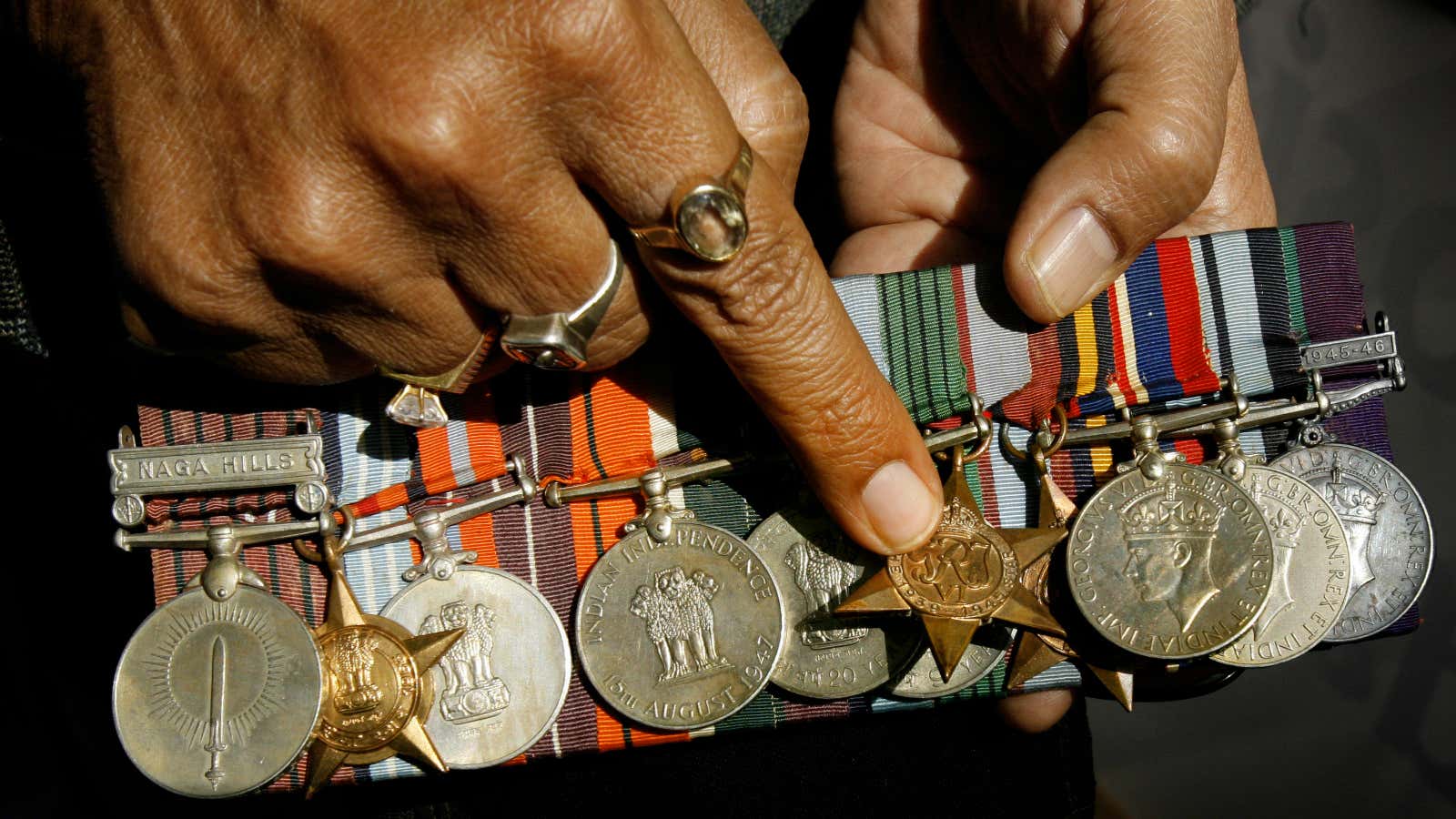A grey-bearded Sikh man’s voice is so hoarse from shouting that he can barely speak, but he still bellows, “Desh ke sainik sadkon par…” And the crowd of around 80 people quickly shouts back: “Ye desh ka bada durbhagya hai.“
“India’s soldiers are on the streets,” they repeat a few more times, “that is the country’s great misfortune.”
The 70-year-old man in a pink turban and a cotton check shirt is retired Major General Satbir Singh. It’s just about noon, and a peaceful demonstration at Delhi’s designated protest spot, Jantar Mantar, is heating up.
The temperature in India’s national capital is anyway soaring—at around 40 degrees celsius.
“If you were to go and ask the defence minister the stretch of India’s borderlines, he wouldn’t know,” said Naik Rama Shrey Pandey, who served the Indian Army for 17 years.
“We do everything, but they are patted on their backs,” he said. “And then they do this to us.”
Indian army veterans are angry—very angry.

Prior to his election victory last May, prime minister Narendra Modi had promised that his government would implement the One Rank One Pension (OROP) scheme.
The scheme essentially ensures that soldiers who retire at the same rank and the same length of service receive the same pension, regardless of when they retired.
This is important because the Indian government periodically reviews the salaries of its employees, and those soldiers who retire before these revisions continue to receive pensions based on the pay structure at the time of exiting the armed forces. That has led to a disparity in the pensions of recent and old retired soldiers.
Moreover, Indian jawans typically retire between 35 and 37 years of age while officers usually serve till their 50s. Some of this has to do with the need to keep the Indian Army—the world’s third largest standing army—in good fighting condition. “Only a very small portion of soldiers go on to take higher ranks,” Singh explained. This, the protestors argue, makes OROP even more essential to rightful compensation.
But even a year after taking office, Modi has been unable to deliver on this promise.
Earlier this month, after a final date of implementation was not given by India’s defence ministry during its meetings with the ex-servicemen, they declared an indefinite nationwide hunger strikes across 20 cities starting on June 15.
“Nowhere in the world are servicemen brought to the roads to demand what their rights are. This is the only country,” Rear Admiral H.C. Malhotra told Quartz.
“It’s not about the money. It’s about our rights—and it is about justice,” said Singh, who retired from the army in 2003, and has been spearheading the campaign as the chairman of the Indian Ex-Servicemen Movement.
So far, no resolution from the Modi government is in sight, even as ex-servicemen from Uttar Pradesh, Haryana and Bihar join the protest in India’s national capital.
“It’s not a small matter. They are sending a wrong message to our soldiers,” Pandey, who came from Rohtas district, Bihar to Delhi on June 14 for the protest, says. ”Our soldiers are standing with their rifles. What would they think: ‘We would have to go through the very same problem.'”
Political game
For the government, the implementation of the OROP scheme “has the makings of a fiscal nightmare,” as a Business Standard editorial wrote. The scheme—likely to benefit some 2.2 million ex-servicemen and 600,000 widows—will cost the government an estimated Rs8,300 crore annually.
Or maybe more. Consider the numbers here:
But, in fact, as (India’s defence minister) Mr (Manohar) Parrikar himself has pointed out, there are independent studies suggesting the cost could be between Rs14,000 and Rs22,000 crore. The exact amount depends on the nature of the entitlement. If it is in the strictest form—everyone who retires at a particular rank receives the same amount—it could be near or above the higher figure.
And that could put a massive dent on the Modi government’s balance sheet.

The demand for OROP, in a way, started in 1973 when under the Third Pay Commission, the pensions of the military and civil services were made the same. ”The fight for equal pensions is at its heart a proxy battle for what soldiers see as restoring their lost ‘izzat’ (honour), for getting what they see as their rightful place in the civil-military balance where political control of the military has translated into bureaucratic control,” social scientist Nalin Mehta wrote earlier this month.
The bureaucrats are the real roadblock, the retired officers argue. ”Babuji nahi chahte hain (bureaucrats don’t want this),” Singh told Quartz.
“Since 1973, they have been diluting the forces because of the overgrowing weaknesses of the political leadership. We vote for politicians because they are accountable every five years. A bureaucrat does what he feels like,” Malhotra added.
For now, the Modi government has indicated that the scheme will be announced right before the Bihar elections. The northern Indian state goes to polls in the next three or four months.
“This was wrong of them to say. Are they trying to lure us into voting for them through this?” Singh asked. “Just tell us the date of implementation.”
No war is bad?
Meanwhile, Parrikar further irked soldiers when he recently said the army was losing its shine because the country had not been to war in the last four to five decades.
“In 1962, I fought the Chinese. In 1965, I fought the Pakistani. In 1971, we fought when Pakistan was divided. Then, we went to Sri Lanka to fight,” recalled 75-year-old retired Colonel Inder Malhotra, who attends the protest clutching his walking stick. “How many more wars do you want to see?”
“Should we just collect at the border and start fighting?” he asked, “Is our honour in fighting, or maintaining peace?”
But even in peace time, India’s retired soldiers are fighting to claim what it rightfully theirs.
